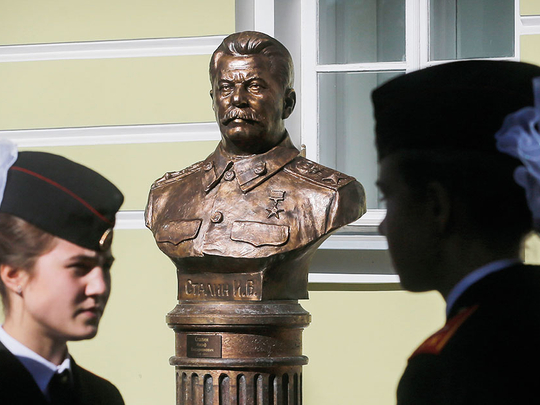
MOSCOW: A bronze bust of Joseph Stalin was unveiled in Moscow on Friday amid increasing concerns in Russia that the authorities are seeking to whitewash the Soviet dictator’s crimes.
Stalin’s sculpture — along with those of major Soviet leaders like Vladimir Lenin and Nikita Khrushchev — was unveiled outside a museum in central Moscow during a ceremony attended by lawmakers.
The seven sculptures spanning the history of the USSR from Lenin to Mikhail Gorbachev are the latest addition to the recently opened “Alley of Rulers” composition that already features 33 Russian rulers.
The display shows heads of state from the Norman warrior Rurik, who founded the first Russian state, to Alexander Kerensky, the head of the provisional government before Lenin seized power in 1917.
It is an initiative of the state-backed Russian Military History Society whose chairman Vladimir Medinsky is known for his fiercely nationalist views.
The display is the work of Zurab Tsereteli, a controversial Kremlin-backed artist whom critics accuse of producing divisive, tasteless sculptures.
At the unveiling ceremony director Stanislav Govorukhin, who chairs the culture committee in the Russian parliament’s lower house, said the project was aimed at the young generation who should study an “unvarnished” version of Russia’s history, “the way it really was.”
Since President Vladimir Putin took power in 2000, there has been a growing chorus of Russians who take a positive view of the Soviet tyrant’s role in history.
Officials have increasingly sought to focus on Stalin’s role in winning the Second World War and downplaying the millions of people executed and sent to labour camps during his rule.
Putin’s spokesman Dmitry Peskov said the display was dedicated to the heads of the Russian state.
“Did Stalin not rule Russia?” he told reporters on Friday.
While supporters of the “Alley of Rulers” initiative say Stalin — like Lenin — is an inalienable part of Russian history, its critics say a monument to Stalin does not belong in a public place.
“A monument in a public space is an acknowledgement of achievements,” said historian Yan Rachinsky, a senior member of Memorial, one of Russia’s most respected human rights organisations.
“The problem is our compatriots simply do not understand the scale of his evil doings and do not understand what Stalin’s purges are,” he told AFP.
“When it comes to the enormity of crimes, the only one who can compete with Stalin is Hitler.”
This past summer a state-run Moscow university sparked outrage by reinstating the Soviet-era plaque marking a speech delivered there by Stalin in 1924. It had been removed in the 1960s.












